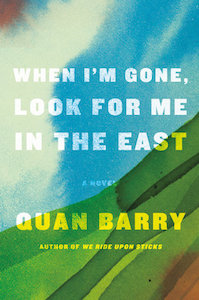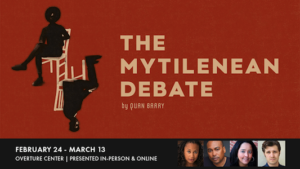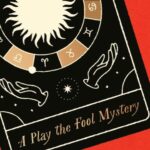Six Things Quan Barry Learned from Being a Multi-Hyphenate Writer
The Poet-Novelist-Playwright Shares Some Wisdom
My writing life is best summed up by an old candy bar jingle: “Sometimes you feel like a nut, sometimes you don’t.” (I appreciate your really seeing me, Almond Joy, though I prefer your nutless sister Mounds!) Coconut-laced candies aside, writing is the one space in my life where I find myself constantly on the prowl for the new and the potentially terrifying.
But if I ever stopped to really think about the gazillion and one things I don’t know when it comes to writing anything beyond poetry (my first love), I never would’ve powered up the Macbook in the first place.
Lesson #1: YOLO is real, so take risks in your writing—reinvent yourself constantly! As a poet-novelist-playwright, I say lay on, Macduff! Try it all on for size. And if your husband asks, What if we fail? tell him: “We fail! That’s why we’re holding onto our day jobs, bruh.” (Disclaimer: I acknowledge that my day job as a professor at a research 1 university allows me the privilege and safety to take risks, so if you aren’t yet in a space to free fall and feel like you’ll land on your feet, perhaps look for smaller ways to reinvent yourself that work with where you’re at.)
I know there are some folks out there who think in terms of “branding,” of becoming known to the world as the writer who does X. But if that doesn’t sound like fun to you, then forget it. Instead, maybe try becoming the writer who’s unpredictable, who has fun wearing all kinds of hats. Don’t be afraid to make your hat collection your brand (though if you’re a one-hat writer, that’s cool too).
Speaking of hats, this past week I found myself sitting in a rehearsal room in the bowels of my city’s arts center. My first play, The Mytilenean Debate, will run here in Madison (and online!) from February 24th—March 13th (sorry for the plug—Lesson #2: give yourself permission to let folks know what you’re up to—this one might seem beyond obvious, but for the Greta Garbo in me, the struggle is real!).
People often ask how my poetry informs my fiction and vice versa. Admittedly, there’s some slippage between those two countries, but not as much as you might think (in a nutshell: language, meet story; story, meet language). Here in my new playwriting truckers hat, though, the lessons are coming at me hard and fast. Happily? Sadly? most of these lessons don’t have to do with actual writing but with life. C’est la vie!
Here are just a few of the things I’ve learned in the past week:
Easy stuff first: #3: playwriting’s made my dialogue sharper, smarter, and my soul more compassionate. As a playwright, you’re asking actors to sell what you’re cooking up, so you better make sure you’re giving them your absolute best cuts of meat. There’s no room for flab. At the end of the day, actors are the face of your writing. I am in awe of them and the ways they make themselves vulnerable on my behalf. Being in this theater world has given me a newfound appreciation for the folks who star in real clunkers like Battlefield Earth or [insert terrible movie here; might I suggest Tenet?]. It ain’t John David Washington’s fault—the man did all he could. As a playwright, I feel much more compassion towards, shall we say, aesthetically-challenged art. And at the end of the aforementioned day, everyone’s doing their best, so maybe let’s cut folks some slack.
Now that we’ve checked the “playwriting’s made me a better person” box: in my fiction, when I create a character who’s a person of color or a member of an underrepresented community, the impact that character has on the flesh and blood world feels mostly conceptual in nature. It’s hard to gauge how much that character’s existence moves the real-world needle toward justice.
But #4: when it comes to theater, creating characters who are people of color is meaningful in a very tangible manner because it creates work for real flesh and blood folks. Creating Black and Brown characters is literally foundational to the work of expanding the theater. Please know that I’m not suggesting that it’s incumbent on creatives of color to singlehandedly carry the burden of expanding representation, but wowzer! I feel beyond fortunate to have done my small part in helping to make space for folks this world needs to see more of.
And for me, #5: writing these POC characters for the stage is an exercise in freedom. My play, The Mytilenean Debate, features three Black characters. For once in my writing life I don’t have to pull up the menu at Starbucks to establish who these folks are—I don’t have to use words like “caramel” or “cinnamon” or “espresso” or mocha Frappuccino.” I can just let them be them. I don’t have to push back against the pre-established mode that all characters, unless otherwise stated, are white. Yass! Hold that S. That’s the sound of me effervescing, luxuriating in the fact that I don’t have to constantly remind the audience that Latimer, Nina, and Mary are Black.
Finally, #6: having one’s play produced is a tremendous lesson in trust and in giving up control. With both my poetry and fiction, in the months before publication, I’m generally hunkered down in the trenches, hitting SEND on a million emails about fonts and cover art and blurbs. Here in the rehearsal room? Nuh-uh. Here I need to sit back, watch, be patient, give the folks in this room the freedom to try all kinds of things with my words. I need to trust that my intentions are there on the page, and I need to trust that the artistic team who believed in me enough to put up the real-world scratch to bring my words to life know what they’re doing.
It makes me happy to see so many young writers trying new things and not getting bogged down in labels—this fluidity is something writers of all ages can embrace, especially folks who’ve been in this game for a while and might be ready to change things up. I wish you writing that interests and empowers you. If you desire it, I hope your Year of the Tiger brings that second (or third, or fourth!) genre into your future. Multi-hypenateness for all!
_________________________________________________

Quan Barry’s novel When I’m Gone, Look for Me in the East is available now via Pantheon.

Tickets for The Mytilenean Debate are available via the Forward Theater Co.




















